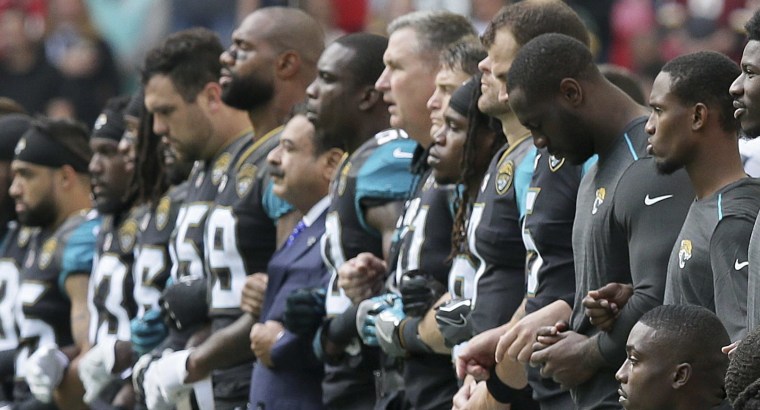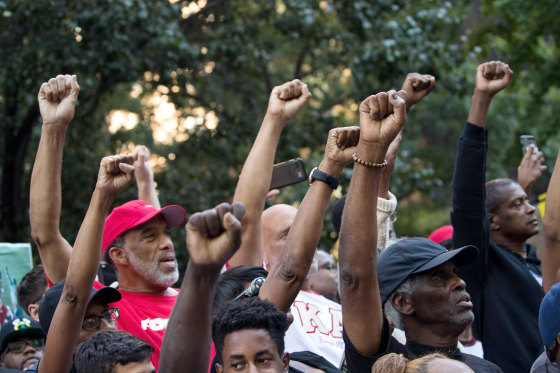A message for white people:
I know how jarring it may be to hear a non-white person, or maybe anyone, even say the words “white people,” as it can take on a pejorative connotation. That’s fine. This isn’t always comfortable to have to say, but that doesn’t make it any less true, necessary, or timely.
Before I get started, I want to be clear, this is for all white Americans. To my friend, to my foe. To my colleagues, my contemporaries, and my competitors. To the professional athlete and the pee-wee league coach. To my family members. From late night hosts to news anchors, faith leaders to police officers. School teachers, small business owners, and service workers. For allies and detractors, everyone.
I don’t have to waste much of my word count on how Donald Trump has been trying to bring us together… around dividing us into sides. It’s not necessary to explain the ways in which his rhetoric - via speeches at rallies, non-stop tweets, and numerous pieces of policy - has sought to elevate the discourse… to just beneath the floorboards.

There is more than enough coverage on all of that, but what this president has done to you, whether you voted for him or not, is put you into an awkward position that either requires your vocalizing your opposition to separate yourself or gleefully accepts your consent by only requiring you do nothing.
Yes, white people your trial subscription to Donald Trump’s America is over and you have to opt-out or start paying for it.
Sorry, but not sorry, you’re going to have to take a side. And yes, you have to do it now.
It’s very likely, and understandable if you feel this is unfair, this is inconvenient, it’s frustrating, it’s difficult, it’s embarrassing, it’s going to alienate you from people you know, love, work with, watch the game with.
That’s privilege. Someone once said, “when you're accustomed to privilege, equality feels like oppression.” This is a taste of equality.
“Yes, white people your trial subscription to Donald Trump’s America is over and you have to opt-out or start paying for it.”
It’s unfair. People of color (ALL people of color, not just Black people) have felt it was unfair when we’ve been mishandled by our government, our jobs, our neighbors, the sales clerks at our favorite stores and the barista at our coffee shops - I’ll stop the list here because I only have so much battery.
It’s inconvenient and frustrating. It’s both to have to ask yourself existential questions about every scenario you exist within when we’re not treated the same, don’t get the same opportunities, access, or attention analogous to our white counterparts because of our skin but then we’re told we need to stop thinking about race, as if it were a problem we created or perpetuate. Join the club.
Related: OpEd: Will the NFL Stand Up to Trump and Acknowledge the Dignity of Its Players?
It’s difficult. It’s difficult when you see something happen in front of you time and time again but repeatedly try to ignore it, suppress it, smile through it, laugh it off while biting your tongue - all because you want to keep your job. Because you need to maintain an important professional or personal relationship. Because you are the only person that looks like you and have no support coming from anywhere else but from within. Join the club.
It’s embarrassing to have to hear racist comments made in your presence, at your expense, or directly to you in the name of a joke, or worse to intentionally disparage you. It’s embarrassing to sit in those situations and not feel empowered to defend yourself yourself.
You think this is a purely an issue of race?
Ask a woman who's been embarrassed at work by a higher-up or even a peer.
Ask a gay person who’s been alienated by their families for their orientation.
Ask a Muslim person who’s been stopped by police for walking down the street how inconvenient it is.
Privilege has protected you for a long time. Privilege also empowers you right now.
The laundry list of things Donald Trump is doing to separate a segment of white Americans from one another, along with the rest of this country is ringing a proverbial bell that can’t be un-rung.
I always hate when people say they voted or made a decision because of the question: “in the future when your grandkids ask you what you did when (insert atrocity of the moment here) happened, what did you do?” I’ve literally never asked my grandparents what they did in times of turmoil with an eye toward judging them if their answer wasn’t what I wanted or expected it to be.
However, in this instance, it may not be your grandchildren’s inquisition, but your friends’. It may not be decades from now, but tomorrow afternoon. It may not be “what did you do?” but more like “where did you stand?”
Don’t think so? In a piece of anecdotal, but emblematic, evidence: More people than ever in my life are glued to their news updates, following political headlines, and are aware of their congresspersons’ stances on issues that matter to them. More than ever before in my short life, my parents, aunts & uncles, cousins and the like; my coworkers, my friends, and my colleagues; but also previously-quiet CEOs and team owners, faith leaders, and world leaders alike are speaking up like we haven’t seen in ages. Some of the aforementioned that even voted for Donald Trump are saying we won’t stand by, we won’t be silent, we won’t tacitly comply or agree with these harmful, divisive, hateful words and ideas.
Republicans have continued to stand behind Donald Trump, if not with a bit of distance, for reasons beyond the scope of this specific conversation. The base that voted for Donald Trump has been pretty unwavering in their support for him and allowance for his actions.
White Americans, no matter which way you voted in November, it’s again time to make a choice before the time is up. You either opt-in by saying and doing nothing, or you opt-out by saying “I don’t believe that.”
Make a choice. Speak up. Unsubscribe.

